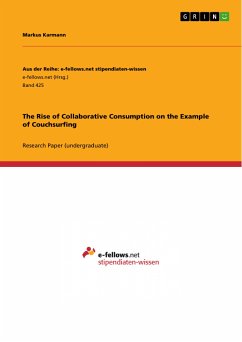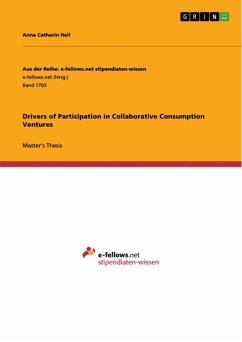Research Paper (undergraduate) from the year 2011 in the subject Business economics - Offline Marketing and Online Marketing, grade: 1,0, Northeastern University of Boston, language: English, abstract: The objective of this paper is to analyze the emergence and the characteristics of collaborative consumption. Moreover, this paper examines the causes and underlying motivations for using Couchsurfing as one particular form of collaborative consumption by focusing on consumers. Lastly, we will provide potential implications of this trend for commercial organizations. In recent years economic life has changed more radically than in the past century altogether. Consumers and firms are getting away from the typical capitalistic principle of "buyers" and "sellers". The new economies are rather defined by "users" and "suppliers". Ownership, which was the underlying principle of decades of capitalism is not desirable anymore as it is "(..) considered outdated and out of place (..)" (Rifkin 2000, p. 5). Nowadays, firms are outsourcing and leasing cars, electronics and even people. It is just not important to own things anymore, but simply to have access to resources. Product life-cycles are becoming shorter and shorter and especially electronic goods are almost outdated shortly after their release. Therefore, companies need to be flexible and react quickly. The principle of ownership can just not fulfil the requirements of an ever-changing and fast-paced economy (Rifkin 2000). While consumers are still more reluctant towards this trend, they are picking up on it. Car-sharing or bike-sharing, for example, is becoming more and more popular in order to (simply) save money and thus replace traditional ways of just buying goods. Furthermore, people are increasingly aware of their (negotiation) power. Groupon, for instance , is only able to offer all these "blockbuster discounts" because there is a huge mass of people behind (it) to "negotiate" big bargains. The rise of the internet and modern communication is an important building block of developing this kind of network economy. Without modern communication it is just impossible to coordinate a network economy and to identify suppliers, users and their needs (Rifkin 2000). This general trend of (either) sharing goods or getting access to it is called "collaborative consumption".
Dieser Download kann aus rechtlichen Gründen nur mit Rechnungsadresse in A, B, BG, CY, CZ, D, DK, EW, E, FIN, F, GR, HR, H, IRL, I, LT, L, LR, M, NL, PL, P, R, S, SLO, SK ausgeliefert werden.









